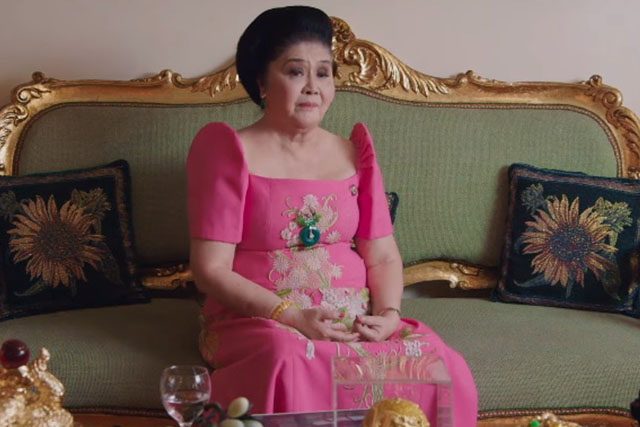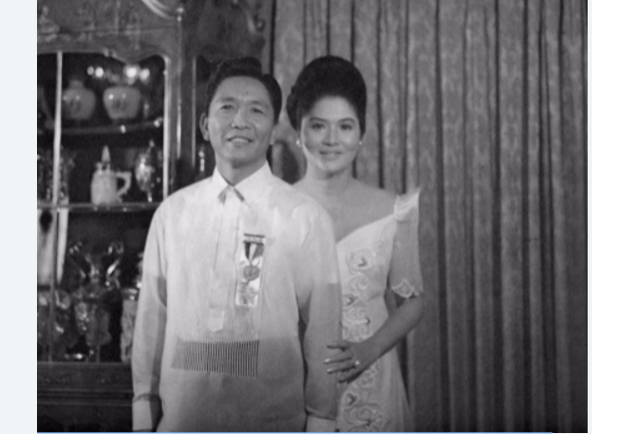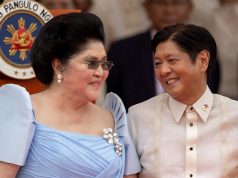
A United States-based filmmaker observed that “The Kingmaker” appears to be a “snub” of a documentary in 2003 on the same subject titled “Imelda.”
Celine Shimizu, the director of San Francisco State University’s School of Cinema and a filmmaker herself, pointed out that the 2019 documentary was at its strongest only “when it repeats the material from ‘Imelda.'”
She said that she was “shocked” at how “The Kingmaker” failed to acknowledge the work of Ramona Diaz, an award-winning filmmaker who was first granted unprecedented access to the former first lady.
“During this Oscar campaign season, Lauren Greenfield’s documentary about Imelda Marcos is stirring controversy. Turns out ‘The Kingmaker’ (2019) is a remake of Ramona Diaz’s ‘Imelda’ (2004)!” Shimizu tweeted.
“Imelda” was initially released in 2003 but it premiered on the Sundance Film Festival the following year, where it won the Excellence in Cinematography Award for documentaries.
During this Oscar campaign season, Lauren Greenfield's documentary about Imelda Marcos is stirring controversy. Turns out ‘The Kingmaker’ (2019) is a remake of Ramona Diaz’s ‘Imelda’ (2004)! #oscarssowhite #decolonizethedocumentary Check out my post: https://t.co/36VPxUUFr4
— Celine Shimizu (@CelineShimizu) November 2, 2019
Shimizu expanded her insight in a blog published by the Oxford University Press, where she noted how “The Kingmaker” dismissed the Sundance-winning work of an American-Filipina that preceded and probably inspired it.
“I was puzzled to read about The Kingmaker (2019) by Lauren Greenfield, touted for its ‘unprecedented access’ (Showtime) by a filmmaker ‘perfect’ for the subject (Variety),” she wrote.
“Does that description circulate because it is a white person who made the movie? Is the author ‘perfect’ because she has made similar films about the decadence of delusional rich white people before?” Shimizu argued.
“When white people themselves are sick of watching white movies in this era of #OscarsSoWhite, and the demand for diversity so urgent and universal in the industry, it’s not a matter of whether they should make films about brown people, but how,” she wrote.
“The Kingmaker is a wish that Ramona Diaz’s film does not exist, effacing a brown woman’s excellence in an industry known for its inequity,” Shimizu continued.
RELATED: What critics abroad are saying about ‘The Kingmaker’ doc on Imelda Marcos’ comeback
Shimizu also noted that it was out of Diaz’s initiative to shoot in Marcos’ mausoleum that led filmmakers such as Greenfield to be able to access a “hard-won location.”

“In one of the earliest scenes in The Kingmaker, we see the preserved body of Ferdinand Marcos shot from different angles in his mausoleum. Ramona Diaz was the first one to shoot in this hard-won location. It is the very site where Imelda first says that ‘here lies love’ will be etched into her gravestone,” she wrote.
“The claim, then, to ‘unprecedented access’ is just one erasure of Diaz’s career-launching film; the many repeated moments and motifs in The Kingmaker are another,” Shimizu continued.
A New York Times review of the documentary initially observed that Greenfield appeared to be “easy” on Marcos.
“There are moments when you wish that Greenfield had pushed harder in ‘The Kingmaker,’ say by taking a closer look at American intervention in the Philippines,” Mahnola Dargis wrote.
What is Ramona Diaz’s ‘Imelda?’
“Imelda” takes an intimate look at the former first lady’s life, from her young beauty queen days to her steady rise in national politics and international scene as the “Iron Butterfly.”
It also offers accounts from her confidantes and opponents who were once imprisoned during the dark years of Martial Law.
There were also foreign personalities who offered a “reality check” that counters Marcos’ own views, such as former U.S. diplomats Stephen Bosworth and Richard Holbrooke and journalists Katherine Ellison and former San Francisco Examiner correspondent Phil Bronstein.
Marcos attempted to block the documentary’s release since according to her, it made her look “like an airhead” and a “frivolous, wanton, extravagant woman at the expense of the poor.”
The effort was futile and it earned Diaz an award from Sundance Film Festival, the largest independent film festival in the U.S.
Sundance Institute itself described the movie as “intriguing” and “haunting” since it featured “unprecedented access to the first lady,” as well as “personal footage chronicling Ferdinand and Imelda’s lives.”









